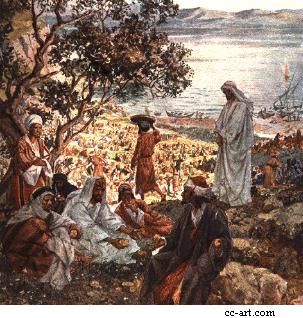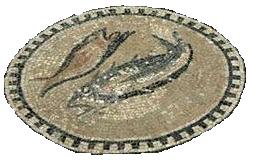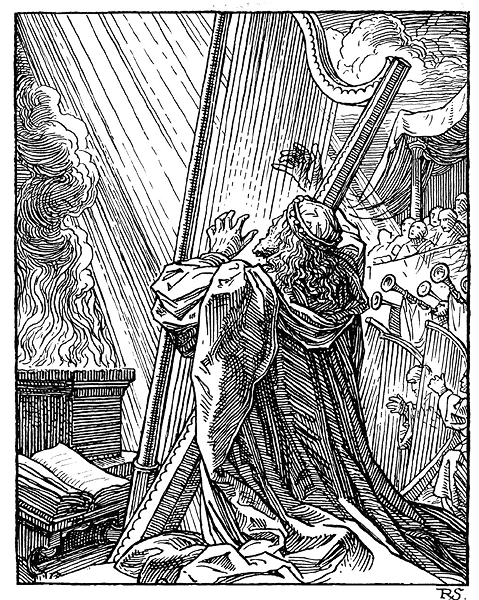Devotional Readings for the Week of July 25th, 2010
7-25-10:
 The Falling Asleep of St. Anna
The Falling Asleep of St. Anna  The Fathers of the 5th Ecumenical Council
The Fathers of the 5th Ecumenical Council
Genesis 18:20-32:
Had Sodom hidden her sin, she still would have sinned, but in fear. But she had utterly lost the curb of fear, in that she did not even seek darkness for her sin. It is written, "The cry of Sodom and Gomorrah is multiplied." Sin with a cry is guilt at liberty. (St. Gregory the Great)
Let us be imitators of the saints. Abraham was specially honored and was called the friend of God; yet he, earnestly considering the glory of God, humbly declared, "I am but dust and ashes." (St. Clement of Rome)
Colossians 2:12-14:
"Blessed are those whose iniquities are forgiven and whose sins are covered. Blessed is the man to whom the Lord has not imputed sin" (Ps. 32:1-2). Thus David points out that remission of sins which followed upon the Lord's coming, by which "He has destroyed the handwriting" of our debt and "fastened it to the Cross;" so that as by means of a tree we were made debtors to God, so also by means of a tree we may obtain the remission of our debt. (St. Irenaeus)
May God "blot out the handwriting that is against you," and grant you forgiveness from your former trespasses. May He plant you into His Church, enlisting you in His service and putting on you the armor of righteousness. May He fill you with the heavenly things of the New Covenant and give you the seal of the Holy Spirit indelible throughout all ages in Christ Jesus our Lord. (St. Cyril of Jerusalem)
Luke 11:1-13:
There are two kinds of prayer, one composed of praise with humiliation, the other of petitions, and more subdued. Whenever then you pray, do not first break forth into petition; but if you condemn your inclination, supplicate God as if of necessity forced thereto. And when you begin to pray, forget all visible and invisible creatures, but commence with the praise of Him who created all things. (St. Basil the Great)
Our Lord shows by means of a parable that cowardice in our prayers is hurtful, but it is of great advantage to have patience in them. (St. Cyril of Alexandria)
Our Lord would not so encourage us to ask were He not willing to give. Let human slothfulness blush, He is more willing to give than we to receive. (St. Augustine)
7-26-10:
 St. Hermolaus, Martyr
St. Hermolaus, Martyr  St. Parasceva, Martyr
St. Parasceva, Martyr
Jeremiah 13:1-11:
Israel might indeed have gloried in God, had they acted truly and from the heart: but when they arrogated all things to themselves, and deprived God of his authority, whose subjects they were, how great was their vanity and folly, and how ridiculous always to profess his sacred name, and to say, "We are God's people;" for he was no God to them, as they esteemed him as nothing. (John Calvin)
Surgeons pass for being cruel, but really deserve pity. Is it not pitiful to cut away the dead flesh of another man with merciless knives without being moved by its pangs? Is it not pitiful that the man who is curing the patient is callous to his sufferings, and has to appear as his enemy? Yet such is the order of nature. While truth is always bitter, pleasantness awaits upon evil-doing. Jeremiah is sent from Jerusalem to the Euphrates and leaves his girdle to be marred in the Chaldean camp among the Assyrians hostile to his people. This simply for the purpose of establishing the truth. (St. Jerome)
Matthew 13:31-35:
We gives thanks to that grain of mustard seed, for that from what appeared a small and despicable seed it has been so spread abroad everywhere by branches rising and extending themselves from the same root that all the birds of heaven may make their nests in them. Thanks be to that leaven which, in three measures of meal, has leavened in unity the mass of the whole human race; and to the little stone, which, cut out of the mountain without hands, has occupied the whole face of the earth (cf. Dan. 2:35), and which to this end everywhere distends itself, that from the human race reduced to unity the body of the whole Church might be perfected, and so the distinction of the several members might serve for the benefit of the whole. (St. Gregory the Great)
The seed of the Gospel is the least of seeds, because the disciples were weaker than the whole of mankind; yet forasmuch as there was great might in them, their preaching spread throughout the whole world. (St. John Chrysostom)
7-27-10:
 St. Panteleimon, Healer and Great-Martyr
St. Panteleimon, Healer and Great-Martyr  St. Natalia, Martyr
St. Natalia, Martyr
Jeremiah 14:17-22:
Jeremiah dictates for posterity a right form of prayer, so that Judah might in exile know that this one thing only remained for them — to confess their sins, as otherwise they could not obtain pardon. (John Calvin)
Every genuine confession humbles the soul. When it takes the form of thanksgiving, it teaches the soul that it has been delivered by the grace of God. When it takes the form of self-accusation, it teaches the soul that it is guilty of crimes through its own deliberate insolence. (St. Maximos the Confessor)
Matthew 13:36-43:
The Lord sends away the multitude, and enters the house that His disciples might come to Him and ask Him privately of those things which the people neither deserved to hear, nor were able. (St. Jerome)
Inasmuch as the Lord has said that there are certain angels of the devil for whom eternal fire is prepared; and as, again, He declares with regard to the tares, "The tares are the children of the wicked one", it must be affirmed that He has ascribed all who are in apostasy to him who is the ringleader of transgression. But He made neither angels nor men so by nature; for we do not find that the devil created anything whatsoever, since he is indeed himself a creature of God like the other angels. God made all things. (St. Irenaeus)
7-28-10:
 St. Prochoros, Apostle and Deacon of the Seven
St. Prochoros, Apostle and Deacon of the Seven  St. Samson of Dol
St. Samson of Dol
Jeremiah 15:10-21:
Let all men be instructed by your works. Thus be the ministers of God and the mouth of Christ. This is what the Lord says: "If you take forth the precious from the vile, you shall be as My mouth." (St. Ignatius of Antioch)
The so-called gods of the Greeks, unworthy of the name, are faithful neither in their essence nor in their promises; for the same are not everywhere. The local deities come to naught in course of time, and undergo a natural dissolution. This is why the Word cries out against them, that "faith is not strong in them," but they are "waters that fail," and "there is no faith in them" (cf. Jer. 9:3; 15:18; Deut. 32:20). But the God of all, being one really and indeed and true, is faithful, Who is ever the same, and says, "See now, that I, even I am He," and I "change not" (cf. Deut 32:39; Mal. 3:6). (St. Athanasius)
Matthew 13:44-46:
This treasure is indeed found without cost; for the Gospel preaching is open to all, but to use and possess the treasure with its field we may not without price, for heavenly riches are not obtained without the loss of this world. (St. Hilary of Poitiers)
He who, as far as is permitted, has had perfect knowledge of the sweetness of the heavenly life, readily leaves all things that he has loved on earth. All that once pleased him among earthly possessions now appears to have lost its beauty, for the splendor of that precious pearl is alone seen in his mind. (St. Gregory the Great)
7-29-10:
 St. Callinicos, Martyr
St. Callinicos, Martyr  St. Theodota, Martyr
St. Theodota, Martyr
Jeremiah 18:1-6:
Christ knows the way of His own works, and what He has fashioned is not to be curiously inquired into. It belongs to someone like us to honor what transcends the human mind with an unquestioning faith. You should know that the prophet Jeremiah was sent to the house of the potter to watch him work. When the pot turned out badly and the potter refashioned the clay into a new vessel, God said to him: "Can I not do with you as this potter has done, O house of Israel? Behold, like the clay in the potter's hand, so are you in My hand." We are transformed spiritually and brought to a holy and utterly good life. Through Him we are reborn, for we no longer contain a corruptible seed but that which is sown by the word of the living God Who endures forever. (St. Cyril of Alexandria)
If this divine plan to exalt and ennoble the creature is the crown of the providential design of the Creator, it is understandable that the simple nature of the creature stands, in relation to this plan which has been decreed, as clay to the potter's hand. (Hans Urs von Balthasar)
Matthew 13:47-53:
To fear is appropriate for us here, rather than to expound; for the torments of sinners are pronounced in plain terms, that none might plead his ignorance, should eternal punishment be threatened in obscure sayings. (St. Gregory the Great)
In this wicked world, in these evil days, when the Church measures her future loftiness by her present humility, and is exercised by goading fears, tormenting sorrows, disquieting labors and dangerous temptations, when she soberly rejoices, rejoicing only in hope, there are many reprobate mingled with the good, and both are gathered together by the gospel as in a drag net; and in this world, as in a sea, both swim enclosed without distinction in the net, until it is brought ashore, when the wicked must be separated from the good, that in the good, as in His temple, God may be all in all. (St. Augustine)
7-30-10:
 St. Andronicos, Apostle
St. Andronicos, Apostle  St. Silas, Apostle
St. Silas, Apostle
Jeremiah 26:1-9:
When God is especially displeased with us, it is yet an evidence of his paternal kindness when he favors us with the prophetic teaching, for that will not be without its fruit, except it be through our own fault. But at the same time we are rendered more and more inexcusable, if we reject that medicine which would certainly give us life. (John Calvin)
It is declared that we ought not obstinately to stick to our decisions, but to modify them with reason and with judgment, and that the better courses should always be adopted and preferred, and that we should turn without any delay to that course which is considered the more profitable. Though each man's end is known beforehand to God before that man's birth, yet somehow He so orders all things by a plan and method for all, and with regard to man's disposition, that He decides on everything not by the mere exercise of His power, nor according to the ineffable knowledge which His prescience possesses, but according to the present actions of men, and rejects or draws to Himself each one, and daily either grants or withholds His grace. (Abba Joseph)
Matthew 13:54-58:
Unimaginable folly of the Nazarenes! They wonder whence Wisdom itself has wisdom, whence Power has mighty works! But the source of their error is at hand, because they regard Him as the son of a carpenter. (St. Jerome)
If His miracles raised their wonder, why did He not work many? Because He looked not to display of Himself, but to what would profit others; and when that did not result, He despised what pertained only to Himself that He might not increase their punishment. Why then did He even these few miracles? That they should not say, "We should have believed had any miracles been done among us". (St. John Chrysostom)
7-31-10:
 St. Joseph of Arimathea
St. Joseph of Arimathea  St. Ignatius of Loyola
St. Ignatius of Loyola
Jeremiah 26:11-24:
There was no other remedy but to submit themselves calmly to prophetic instruction, and at the same time to flee to the mercy of God; for by the fear of God here is meant true conversion? What else is God's fear than that reverence by which we show that we are submissive to his will, because he is a Father and a Sovereign? (John Calvin)
We shall possess the holy mountain of God, that is His Kingdom, if we fulfill His law and listen to what is said, "Make your ways clean before Him." (St. Pachomius)
Matthew 14:1-12:
They, who in authority are fenced about with much pomp, learn of the things of God slowly, because they do not much regard them. (St. John Chrysostom)
Herod excuses his crime by his oath, that his wickedness might be done under a pretence of piety. (St. Jerome)


